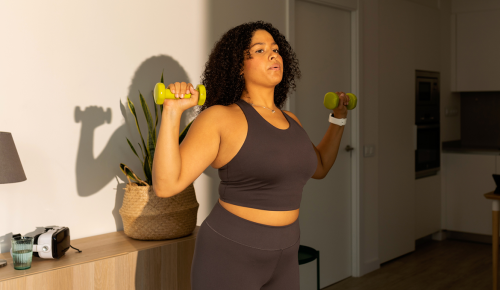I don’t remember exactly when or why I broke the colander. But I do remember hurling it across the kitchen all of a sudden, over nothing.
Experts in This Article
In the weeks after my father’s death, I was buffeted by wave after wave of rage, confusion, and misery. Months have now passed, and I have days, weeks of calm now, before grief hits me again. The last wave, which lasted a week, was ferocious, and I am still clawing my way back to the surface.
I have never felt grief like this before; I have never lost a parent before. So the grief that now lives in my house is a new guest. An unwelcome one. But as the months have passed, I think I’ve found one way to keep our relationship a bit more harmonious.
I have been running, on and off, for 20 years. It had always been a simple transaction for me—if I ran, I got to stay in skinny jeans and also eat cake.
But the first time grief came running with me it was an altogether new experience. For one thing, grief did not enjoy my playlists. The cheesy anthems that used to make me think of happy nights out now gave me a weird sense of FOMO for my own life. I wanted none of that. I wanted to be consumed by my feet hitting the ground, and the air in my lungs.
Now when I run, I seek out music without lyrics; songs without meaning or memories. I crave nothingness but weirdly, I get clarity. I’ll set off feeling irritated, unable to untangle my thoughts or see clearly which of the many things I am bothered by today. Somewhere along the way, the thread untangles and I can figure out what thorny issue is haunting me.
In the beginning, feeling reckless, I tried a new route and ended up completely lost, my ankles scratched to bits and my energy depleted. I walked home, sheepishly, through a golf course, too tired to run another step. I didn’t feel much better but it did somehow help for my physical state to match the mess inside my head.
Now I stick to the same familiar route—down the hill, into the park, past the bramble patches where Dad took me berry-picking during lockdown with the kids. By the time I’m off the road and into the field, I am always feeling better in some way. Calmer. Clearer. The rhythm eases the roaring of my thoughts so I can see them, one at a time. Then it’s back up the hill, and all I can do is focus on getting one foot after another up the steep incline. I get home breathless, and feeling just a little better than when I set off.
I’m the sort of person who, ridiculously, wants to achieve top marks for my grieving, so I check in with psychologist Charlotte Fox Weber. In her work with grieving clients, she’s found the vast majority have benefitted from physical exercise as part of their process.
“For almost every one of my clients, people need movement when they are grieving,” she says. “There’s a very heavy feeling that comes with grief and you can’t always talk your way out of it.”
I’m surprised to hear this. I had thought that to move through my grief I’d have to face it, make myself feel it. But Weber says this isn’t always the best strategy.
“If you just sit and think about something from every angle, there’s a stagnancy that happens that can be unbearable and circular, and can make rumination worse.”
Most experts agree that exercise is a good idea in general for processing grief. Books like Julia Samuel’s Grief Works recommend building cardiovascular activity into a regular regimen to help regulate the body, alongside healthy eating and relaxation exercises. Though Maria Bailey, founder of griefspecialists.org, warns against using exercise as a distraction behavior: “It’s common for people to try and replace their feelings of loss by subconsciously filling the void. Some turn to food, others can turn to alcohol, but exercise is a common distraction, due to the good feelings you get from it. If you find you need bigger and better exercise ‘hits’ it might be time to stop and think about why. It could be that you need to acknowledge your feelings by talking to someone you trust, or you might need to find some professional help.”
So far at least, I don’t see much danger of running becoming an addiction for me. But it is, however, now something that I have a compulsion to do, rather than the thing I used to force myself into. When the edgy emotions build up, my sneakers go on.
Running is now the place where I can feel the anger, and be in the sadness, and have it flow through my veins without the distractions of anyone else’s heartache, or the list of things I have to do. But running is also a place where I can feel safe from those emotions, rather than overwhelmed.
I am not saying that running is making everything all right. I am not hitting anything like a runner’s high. But, somehow, pounding the pavement every few days is helping me to understand my feelings, take less of my anger out on kitchen utensils and, somehow, leave a little bit of the sadness behind.
Running isn’t the only way to move through grief. Try this yoga flow for heartbreak:
Sign Up for Our Daily Newsletter
Get all the latest in wellness, trends, food, fitness, beauty, and more delivered right to your inbox.
Got it, you've been added to our email list.











